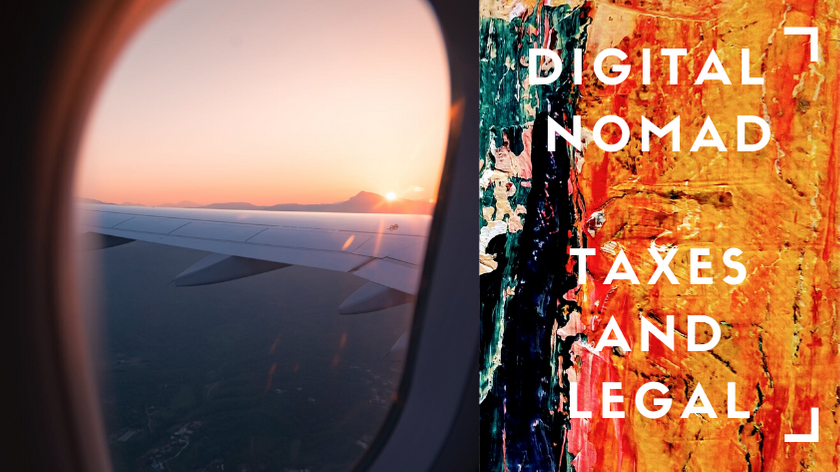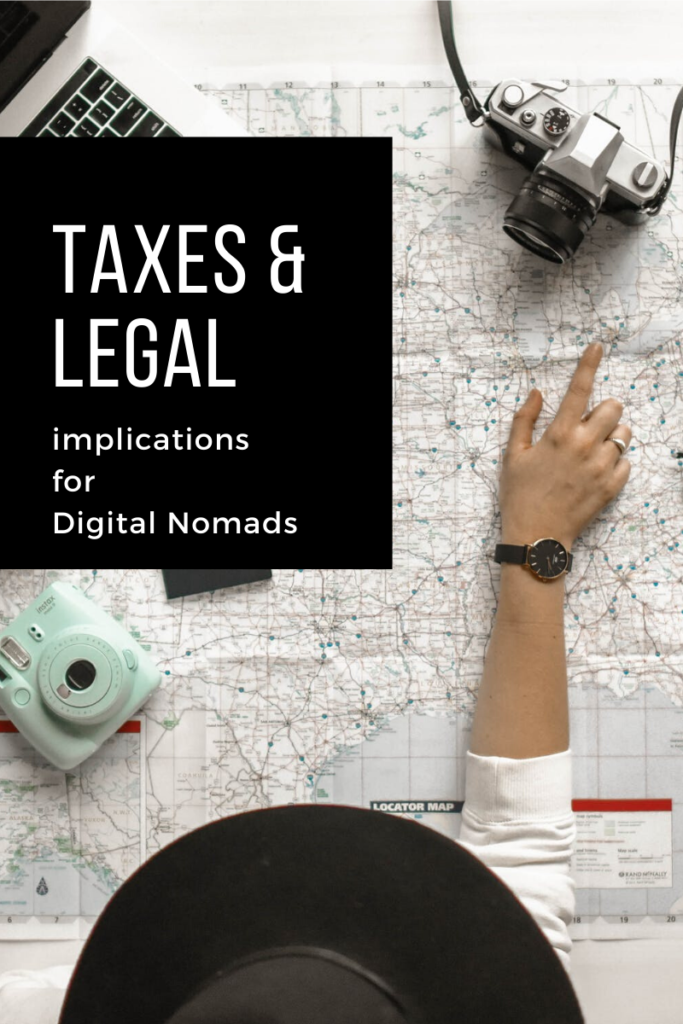You want to be a digital nomad, but you wanna do it by the book.
You don’t want to end up in trouble with tax authorities, or being hauled into a foreign jail and having to get your friends or family to come bail you out.
While the idea of living the laptop lifestyle used to be a pipe dream that was only sold by scammers online, now, it’s actually a reality. There are tons of digital nomads around the world who are earning a good living and traveling the world.
If you’re like me, then you probably find this idea attractive, but there are still some missing pieces of the puzzle. How the heck do you file your taxes? What are the legal implications of being location-independent?
I am not an accountant or lawyer, so this is not legal or tax advice. It is my opinion. I recommend consulting both an accountant and a lawyer to properly guide you.
What follows is my experience as a digital nomad, and some tips/advice that I’d like to pass on to you!
Here’s How Taxes Work
Let’s start with the tax implications of being a digital nomad and earning money as you travel. No one likes taxes, but they do allow our governments to function properly.
When it comes to taxes, we’re usually referring to:
- State and Local income taxes
- Federal income taxes
- Possibly self-employment tax
Naturally, these tax regulations will vary from country to country and state to state. For example, in Massachusetts, there is a 5% income tax on salaries, wages, tips, and commissions. However, in Florida, there is NO state income tax.
Your state and local taxes will be tied to where your legal permanent residence is. When it comes to the United States, all citizens must be a resident of a state for tax purposes. Typically, this is determined by:
- Where you’re registered to vote
- Where you lived most of the year
- Where your mail goes
- Your state driver license issuer.
When you are abroad, if you are still a United States citizen, you will still pay state income taxes on a federal level. You may also need to file a state return.
“If you are a US Citizen or resident alien living abroad not only do you have to ensure you file an income tax return with the IRS each year if you meet the minimum filing requirements, you may have to file a state tax return.” – Source
I would probably look up the state you are from and see what the minimum filing requirements are for filing a state return. When you are searching online, I would recommend using the keyword “expat.” For example, in Massachusetts, you can read the following requirements:
“Everyone whose Massachusetts gross income is $8,000 or more must file a Massachusetts personal income tax return.” – Source.
This means that even if you were living abroad, you’d at the very least have to file your taxes in the state. How much you paid would need to be talked about with an accountant. You’d also need to track how often you’re home, if you’re a part-time resident or if you’re a non-resident.
In most cases, Digital Nomads are usually traveling for only part of the year and returning home occasionally. I would think about how long you want to travel and how often you will be back.
What About Expat Taxes?
Now, things get a bit more tricky if you consider yourself an expat instead of a digital nomad. As an expat, you’re basically living overseas for good.
“Most expats do not pay US taxes because of the Foreign Earned Income Exclusion or Foreign Tax Credit benefits. However, expats still need to file taxes annually, even if they do not owe any taxes to the IRS. This holds true for the massive number of US expats that have gross worldwide income over the filing threshold.” – Source.
In addition, expats may be working at a company that is based outside of the United States. They may have a foreign bank account and residence.
Even if you don’t end up paying US taxes as an expat, you will still need to report your income.
Discussing Expat taxes goes beyond the scope of this article. It will also require consulting an accountant or outside help likely.
With this article, we are focusing on digital nomads who are traveling a couple of months at a time, and plan to continue to come back to the USA.
When you transition into the expat category, you then have to start thinking about things like taxes that you may owe to foreign governments (if you’re living abroad).
Foreign Earned Income Exclusion
There is something known as the foreign earned income exclusion, where you can exclude up to $100k of income earned abroad as long as these conditions are met:
- Physical Presence Test: You must live and work outside the USA for at least 330 days of any 365 day period.
- Bona Fide Residence Test: You must be living and working in a foreign country for an entire calendar year.
Again, this is for those hardcore nomads who are basically expats and do not plan on returning to the USA very much at all. You can learn more about the foreign earned income exclusion here.
Do You Pay Taxes to Foreign Governments?
This will depend on if you are sourcing income from those countries, if you’re employed there, your visa status, and the laws of that particular country.
In addition, if you are setting up an operation abroad, where you’re dealing with inventory, paying suppliers, etc, then you may need to look more closely into the local rules and regulations.
For the average nomad who’s just gone for 6 months bouncing around the globe and is working from their laptop, chances are you won’t have to pay taxes, especially if your income sources are all online and not from local businesses.
What All This Means For YOU
For the average digital nomad who is traveling for 6 – 8 months, is visiting different countries, and is working from their laptop, this means that:
- You still must file and pay state/local taxes if you’re in a state that requires this
- You still must file and pay federal taxes
- You may or may not need to pay self-employment taxes depending on your job status.
Remember, there are many different types of digital nomads.
Some are freelancers (aka self-employed). Others are working for a company in a location-independent fashion. And, there are those like me, who have a business entity.
BTW – Even if you are a freelancer, I would recommend having a business entity, like an LLC or Limited Liability Company to shield yourself from legal liability.
Visas and Legal Issues
Phew, so we covered the taxes you’ll have to consider as a digital nomad. Now, let’s dive into the visas and legal issues you should be aware of.
The visa laws vary in two ways:
- Your home country residence
- The country you are visiting
As a US resident, there are countries that are more friendly to me than others. As a resident of an another country, you need to check the visa laws for the country you’re visiting.
In general, most digital nomads will use the following visas:
- Tourist visa: Varies by country, but usually 30 – 90 days for US citizens. You can typically extend it, or do a “visa run” and re-enter the country to get your passport stamped again.
- Immigration/naturalization: This is more for expats. If you’re intending in living in a foreign country for a long time, you’ll want to look into this.
- Student visas: If you want to learn a language or take other credible education while abroad, you could consider this option.
- Work or Business Visa: If you’re planning on doing things like attending business meetings, buying/investing, consulting, etc.
In my travels, the tourist visa is definitely the most popular, however I also see some who are doing the education visa. The main thing with this type of visa is that you adhere to the requirements.
For example, in Thailand, you can get an education visa, but you must:
“Have been accepted on a full-time educational course, training program, or internship in Thailand. The school and course must be recognized by the Thai Government and the course must require students to attend classes for at least 100 hours for every 90-days; this roughly amounts to 8-10 hours per week.” – Source
One creative way to fulfill this requirement would be to learn the Thai language, or take Muay Thai classes. Just remember that you’re committing to that course of action for a good amount of time, so you can’t always be traveling.
You can also look into some countries that have alternative visa options for digital nomads. For example, Malaysia has a 1 year tourist visa!
Legalities of a Business As a Nomad
Okay – so, you could start a business in the United States OR one abroad, in another country.
Let me just knock this out of the way and say that setting up a business in another country goes beyond the scope of this article, but that there is a great guide on the pros and cons of this here.
One line that stood out to me is:
“One of the largest benefits to operating an overseas corporation is that of tax deferral. You can use tax-deferred money to generate extra profits by re-investing the tax savings amount into the corporation. This practice can produce enough extra income to equal – and possibly surpass – the amount in taxes which would be owed.” – Source
So, you won’t get away with not paying taxes if you are a US citizen, but you could defer those taxes it appears with a foreign corporation.
When it comes to a business within the United States, you have a few different options:
- Sole Proprietor: What you are by default in the eyes of the law if you’re a freelancer.
- Limited Liability Company: This offers some legal protection by making it so that your own assets and your company’s are different. If someone sues your company, they can’t get to your personal assets (though you must follow rules to establish this separation).
- S Corporation: These are taxed differently than LLCs, though as an LLC you can elect to be taxed as an S corporation.
- C Corporation: These typically are reserved for larger companies with multiple stockholders and potential investors. They require you to pay corporate tax and taxes after you distribute, so double taxes. There is definitely more separation of assets tho from the company and the founder.
For the average digital nomad, you’d probably be most interested in a single-member LLC or an S corporation. There are tax savings to be had depending on which you choose.
As a single member LLC, the income generated passes through to you as the individual and you pay regular income taxes and self-employment taxes.
As a S Corporation, you are an employee of the company and thus must set up a payroll system. But, you don’t have to pay self-employment tax.
Having a corporate entity will help to shield you should any of your customers ever decide to sue you. It is also good business practice to:
- Have a company credit/debit card to track company expenses
- Have a separate company bank account
- Have an EIN number to track company revenue to establish the corporate veil.
Why You Should Have a Business
Even if you’re a freelancer, this is why you should have a business.
Aside from the things I mentioned in the last section, business owners get considerable benefits.
Let’s just say that you don’t know how to operate a business. You don’t know anything about tracking expenses.
Individual 1: You don’t know anything about business
You earn $75,000.
You pay taxes on this number, and let’s assume it’s about $22,500 in taxes.
You end up with $52,500 at the end of the year.
Individual 2: You are educated about business
Now, let’s factor in what would happen if you knew how to properly track your expenses, income, and operate as a business.
You earn $75,000.
You have $15,000 in tracked expenses using software like Quickbooks or even just Excel.
Your “taxable income” is $60,000 and so you pay $18,000 in taxes.
You end up with $57,000 at the end of the year.
This is a difference of $4,500. You basically saved yourself this money.
Pretty neat, huh?
These are the same people. One is just paying more taxes because they don’t know anything about business.
The Laws Are In Your Favor
In general, the laws are in your favor as a business owner.
For example, with the recent paycheck protection program, you could get considerable free money just by virtue of being a business owner. Self-employed individuals do apply under this program.
I hope that this shows you why it’s so freakin’ important to become educated about these things. That’s really my passion is to help you do this whole digital nomad thing, but in a smarter way.
If you’d like to discover more tricks like the ones I’ve mentioned, you can check out some of them here.







